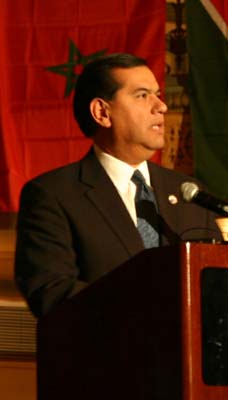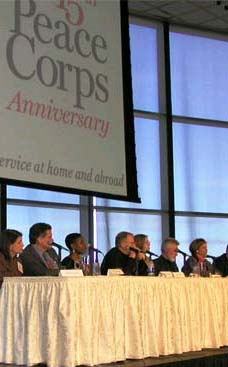2005.09.30: September 30, 2005: Headlines: COS - Togo: Hurricane Relief: Awards: Journalism: Katrina Stories Project: Josh Norman writes: Lessons learned from Katrina from my time away
Peace Corps Online:
Directory:
Togo:
Peace Corps Togo :
The Peace Corps in Togo:
2005.09.30: September 30, 2005: Headlines: COS - Togo: Hurricane Relief: Awards: Journalism: Katrina Stories Project: Josh Norman writes: Lessons learned from Katrina from my time away
Josh Norman writes: Lessons learned from Katrina from my time away

When I left the Peace Corps, I was warned about the relative indifference of the rest of the world, especially from my fellow Americans, in regards to what I did and what I went through. My point of relating those experiences is to put in perspective what happened last weekend when I was visiting with my Peace Corps friends, all of whom went through similar difficulties after their time abroad. “So you live in South Mississippi now, huh?” one would ask. “Yep,” I would reply. “It’s really messed up down there, huh?” the next question would be. Or, “What’s it like? “It’s a learning experience,” would be my reply.
It was a little jarring to hear Peace Corps volunteers, who had dealt with the difficult questions themselves, turn around and lay them on me. I suppose that you can’t understand it until you see it, smell it, live it. I know that all the reporters who come here from elsewhere, stay a while and then leave still don’t get it. Shoot, even I don’t really get it.
Josh Norman writes: Lessons learned from Katrina from my time away
Josh Norman: Lessons learned from my time away
1) It is hard for many people outside of this area to care about what is happening in Mississippi because it is even harder to understand.
What happened in New Orleans was a palpable and photogenic tragedy. What happened here is simply mass destruction and devastation on an incomprehensible scale.
When I left the Peace Corps, I was warned about the relative indifference of the rest of the world, especially from my fellow Americans, in regards to what I did and what I went through. The following conversation was frequent:
“Wow, you were in Africa?” a curious individual would ask.
“Yep,” I would reply.
“What was it like?” the curious individual would ask.
At this point, I wouldn’t know what to say. Try summing up any two year period of your life in which your ideas on humanity, happiness, metaphysics, social interactions, hygiene, language, right and wrong, up and down, and the way the world turns were completely turned on their head.
Sometimes, I would be curt.
“It was a learning experience,” I would often say.
On other occasions, I would be thorough and give anecdotes about my cat getting eaten, my projects (and my house for that matter) being stolen from, my illnesses and the desperate squalor. I would also add the happy stories about smiles, sunsets and strong drinks.
Then, there would usually be a ridiculous question. Example: “Were there any lions?”
At first, I was upset by this. Then, one day I realized how detached the questioner was from my experience and what had informed them about Africa to that point.
My point of relating those experiences is to put in perspective what happened last weekend when I was visiting with my Peace Corps friends, all of whom went through similar difficulties after their time abroad.
“So you live in South Mississippi now, huh?” one would ask.
“Yep,” I would reply.
“It’s really messed up down there, huh?” the next question would be. Or, “What’s it like?”
“It’s a learning experience,” would be my reply.
When I would get into details, try and expand upon the experience a bit, I got this question occasionally: “So it’s kind of an adventure, huh?”
“No, it’s actually really f****d up,” I would reply.
I relate all this not out of bitterness. I wanted people to not care or talk that much about what was happening. I went to the Green Mountains to detach myself as much as possible from Mississippi.
But it was a little jarring to hear Peace Corps volunteers, who had dealt with the difficult questions themselves, turn around and lay them on me.
I suppose that you can’t understand it until you see it, smell it, live it. I know that all the reporters who come here from elsewhere, stay a while and then leave still don’t get it. Shoot, even I don’t really get it.
I see, smell, feel, taste and hear the devastation all the time. I saw Hurricane Katrina coming and I watched her go. Yet I don’t understand the situation fully.
I loved Mississippi the moment I got here. Great food. Great outdoors. Great people.
To see it ripped to shreds though, has left me confused and wanting of a better picture or frame of reference for the whole situation. But even those who have been here decades don’t get it, which brings me to the second thing I learned while roaming Vermont’s lovely mountains…
2) The mental health of people living and breathing the disaster is precarious at best
.
Because we can’t grasp the entirety of what’s happening, we have no chance of gaining a routine. There is nothing comfortable about being here, let alone working and living in it.
It is nearly impossible to “recharge” for large, daily tasks while here. All that being here seems to do is break you down.
One of the hardest parts about Africa was how different everything was. The hardest part about here is how different everything has become.
There is no getting back to normal. I even disagree with the saying “Getting back to the new normal.” The base that was there is gone. Building from the ground up means any kind of normal is gone.
It is hard to understand that.
Almost two out of every three dwellings in South Mississippi are gone or unlivable. To comprehend that, go outside, look at your block and say there-gone-gone-there-gone-gone as you glance from building to building. That’s saying nothing about the jobs, schools and lives lost.
When people begin to get that, and few do and even fewer seem to try, it is beyond jarring. It is worse than being slapped, beaten or knocked out.
There is an immeasurable degree of humiliation in the face of a force not only beyond control but miles past understanding.
On to my final learning point…
3) There is no horizon.
The endgame is unforeseeable. A conclusion is impossible.
Therefore it is now a question of picking oneself up and learning to work and live with that.
When this story was posted in May 2006, this was on the front page of PCOL:





Peace Corps Online The Independent News Forum serving Returned Peace Corps Volunteers
 | It's Official: Vasquez nominated to FAO
Exactly one week ago we predicted that Director Vasquez would soon be receiving a major ambassadorship. Today the White House confirmed that Vasquez will be the new Representative to the United Nations Agencies for Food and Agriculture replacing Tony Hall.
PCOL Comment: Director Vasquez, let us be the first to thank you for your service to the Peace Corps, congratulate you on your new appointment, and wish you good luck in your future endeavors. Although we have had our differences over the years and we opposed your nomination in 2001, we think you are leaving a solid legacy of accomplishment and have served the Peace Corps well.
Initiatives and Accomplishments: Vasquez's major initiatives and accomplishments since becoming Peace Corps Director include: an agreement with Mexico in 2003 to host volunteers, sending RPCVs to work domestically in Hurricane relief after Katrina, emphasis on recruitment of minorities and of community college graduates, upgrading Peace Corps' infrastructure especially IT upgrades in the online application tracking process and the Volunteer Delivery System, an emphasis on safety and security of volunteers including the creation of a Situation Room at Peace Corps Headquarters, modifying Peace Corps' "Five Year Rule" for employment, and the expansion of the Peace Corps to its highest level in 30 years. He is the third longest serving Peace Corps Director after Loret Ruppe Miller and Sargent Shriver. |
 | The Peace Corps Library
The Peace Corps Library is now available online with over 40,000 index entries in 500 categories. Looking for a Returned Volunteer? Check our RPCV Directory. New: Sign up to receive PCOL Magazine, our free Monthly Magazine by email. Like to keep up with Peace Corps news as it happens? Sign up to recieve a daily summary of Peace Corps stories from around the world. |
 | Interview with a Hit Man
RPCV John Perkins says that for many years he was an "economic hit man" in the world of international finance whose primary job was to convince less developed countries to accept multibillion dollar loans for infrastructure projects that left the recipient countries wallowing in debt and highly vulnerable to outside political and commercial interests. In this exclusive interview for "Peace Corps Online," Colombia RPCV Joanne Roll, author of Remember with Honor, talks to Perkins about his Peace Corps service, his relation with the NSA, "colonization" in Ecuador, the consequences of his work, why he decided to speak out, and what his hopes are for change. |
 | Peace Corps stonewalls on FOIA request
The Ashland Daily Tidings reports that Peace Corps has blocked their request for information on the Volkart case. "After the Tidings requested information pertaining to why Volkart was denied the position — on March 2 — the newspaper received a letter from the Peace Corps FOIA officer stating the requested information was protected under an exemption of the act." The Dayton Daily News had similar problems with FOIA requests for their award winning series on Volunteer Safety and Security. |
 | PCOL readership increases 100%
Monthly readership on "Peace Corps Online" has increased in the past twelve months to 350,000 visitors - over eleven thousand every day - a 100% increase since this time last year. Thanks again, RPCVs and Friends of the Peace Corps, for making PCOL your source of information for the Peace Corps community. And thanks for supporting the Peace Corps Library and History of the Peace Corps. Stay tuned, the best is yet to come. |
 | History of the Peace Corps
PCOL is proud to announce that Phase One of the "History of the Peace Corps" is now available online. This installment includes over 5,000 pages of primary source documents from the archives of the Peace Corps including every issue of "Peace Corps News," "Peace Corps Times," "Peace Corps Volunteer," "Action Update," and every annual report of the Peace Corps to Congress since 1961. "Ask Not" is an ongoing project. Read how you can help. |
 | PC announces new program in Cambodia
Director Vasquez and Cambodia's Deputy Chief of Mission Meng Eang Nay announced a historic new partnership between the Peace Corps and the Kingdom of Cambodia that will bring volunteers to this Southeast Asian country for the first time. Under King Norodom Sihamoni and Prime Minister Hun Sen, Cambodia has welcomed new partnerships with the U.S. government and other U.S. organizations. |
 | Peace Corps suspends program in Bangladesh
Peace Corps Director Gaddi H. Vasquez announced the suspension of the Peace Corps program in Bangladesh on March 15. The safety and security of volunteers is the number one priority of the Peace Corps. Therefore, all Peace Corps volunteers serving in Bangladesh have safely left the country. More than 280 Peace Corps volunteers have served in Bangladesh since the program opened in November 1998. Latest: What other newspapers say. |
 | Invitee re-assigned after inflammatory remarks
The Peace Corps has pulled the invitation to Derek Volkart to join the Morocco Training Program and offered him a position in the Pacific instead after officials read an article in which he stated that his decision to join the Peace Corps was in "response to our current fascist government." RPCV Lew Nash says that "If Derek Volkart spoke his mind as freely in Morocco about the Moroccan monarchy it could cause major problems for himself and other Peace Corps volunteers." Latest: Volkart reverses stance, takes new assignment in Paraguay. |
 | RPCV admits to abuse while in Peace Corps
Timothy Ronald Obert has pleaded guilty to sexually abusing a minor in Costa Rica while serving there as a Peace Corps volunteer. "The Peace Corps has a zero tolerance policy for misconduct that violates the law or standards of conduct established by the Peace Corps," said Peace Corps Director Gaddi H. Vasquez. Could inadequate screening have been partly to blame? Mr. Obert's resume, which he had submitted to the Peace Corps in support of his application to become a Peace Corps Volunteer, showed that he had repeatedly sought and obtained positions working with underprivileged children. Read what RPCVs have to say about this case. |
 | Why blurring the lines puts PCVs in danger
When the National Call to Service legislation was amended to include Peace Corps in December of 2002, this country had not yet invaded Iraq and was not in prolonged military engagement in the Middle East, as it is now. Read the story of how one volunteer spent three years in captivity from 1976 to 1980 as the hostage of a insurrection group in Colombia in Joanne Marie Roll's op-ed on why this legislation may put soldier/PCVs in the same kind of danger. Latest: Read the ongoing dialog on the subject. |
Read the stories and leave your comments.

Some postings on Peace Corps Online are provided to the individual members of this group without permission of the copyright owner for the non-profit purposes of criticism, comment, education, scholarship, and research under the "Fair Use" provisions of U.S. Government copyright laws and they may not be distributed further without permission of the copyright owner. Peace Corps Online does not vouch for the accuracy of the content of the postings, which is the sole responsibility of the copyright holder.
Story Source: Katrina Stories Project
This story has been posted in the following forums: : Headlines; COS - Togo; Hurricane Relief; Awards; Journalism
PCOL32507
49




















